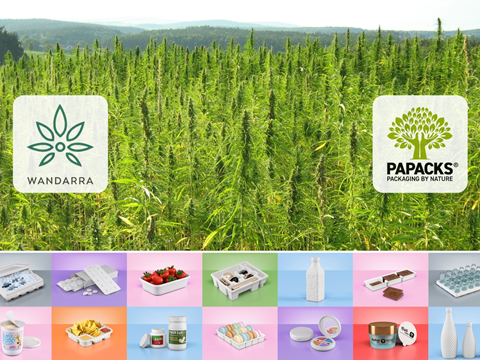
In a strategic partnership, ag-tech solutions firm Wandarra will utilize PAPACKS’ turnkey solution to replace fossil plastic packaging with hemp-based alternatives – intending to reduce waste and pollution in Australia.
Reportedly, the country manufactures 5.5 million tonnes of packaging material every year. Only 49% of this figure is believed to be recycled at end-of-life, which would theoretically condemn the rest to landfill or the ocean.
In their recently executed Memorandum of Understanding, Wandarra and PAPACKS aim to cut down on packaging pollution and benefit industrial hemp cultivation in North Queensland, bolstering Wandarra’s position in the Asia-Pacific region.
The partners plan to formalize an Australia-APAC exclusive IP licensing agreement over the next few weeks.
Wandarra is based in Townsville, North Queensland, near the Great Barrier Reef. It seeks to distribute hemp-based products via its logistics network – including rail, road, sea, and air – and establish itself as a leader in regenerative agriculture, climate protection, and the circular economy.
Meanwhile, PAPACKS’ turnkey solution is said to result in ‘seamless’ production and help collaborators embrace sustainability-minded packaging technologies; this includes equipment training and commissioning. It also specializes in preparing and processing hemp, which has culminated in HempPulp – a patented, virgin pulp material derived from industrial hemp cellulose.
Bringing their areas of expertise together, the partners plan to conduct initial testing by producing samples in Germany. These will then be delivered to North Queensland to accommodate the preferences of local consumers.
At the same time, the Australian production team will go to Germany to train on PAPACKS’ production lines. Equipment will subsequently be commissioned, accepted, and transported to the final Wandarra production site; this is expected to take place in Q4 2024.
Smart Precinct NQ Queensland will contribute to the partnership in its overall goal to replace single-use plastics. These efforts will support a Circular Economy programme, which is anticipated to replace single-use plastics and establish North Queensland as an industry leader.
“North Queensland’s responsibility to the Great Barrier Reef is unique, and the news of plastic detected on the outer reef is disturbing,” said Steve Tiley, CEO of Wandarra. “Our collaboration with PAPACKS provides an immediate solution for food and beverage manufacturers to meet their sustainability goals.
“The PAPACKS team has developed world-leading technology that started as a concept in a garage, just 10 years ago. Their perseverance in research and development is an outstanding achievement.”
“Our partnership with Wandarra is a significant step towards eliminating single-use plastics and protecting valuable ecosystems like the Great Barrier Reef,” added Tahsin Dag, founder and CEO of PAPACKS. “By combining Wandarra’s resources with our innovative technologies, we will sustainably influence the packaging industry in Australia and the Asia-Pacific region.
“This collaboration demonstrates, and practically implements, our shared commitment to sustainability and environmental protection.”
Earlier this year, PAPACKS signed a strategic cooperation agreement with European Material Bank (EMBA) in hopes of producing virgin pulp material for paper-making and moulded fibre packaging industries. The partners intend to help develop, process, and produce such renewable raw materials as sugar cane, eucalyptus, and bamboo.
PAPACKS went on to sign a Memorandum of Understanding with element6 Dynamics, an industrial hemp provider, in an effort to expand hemp-based moulded and thermal-formed packaging on the US market. This is anticipated to contribute to decarbonization, deforestation, and plastic reduction.
It is also working with Bayer to package consumer health brands like Aspirin, Bepanthen, and Claritin in biodegradable, fibre-based packaging. The goal is to achieve 100% reusable or recycle-ready packaging by 2030.
In other news, Cadbury Australia previously signed a deal with Amcor to source around 1000 tonnes of post-consumer recycled plastic for its chocolate packaging. This recyclate is set to be incorporated into flexible packaging for 500 million family-sized Dairy Milk chocolate blocks and lower the company’s reliance on virgin plastics.
If you liked this story, you might also enjoy:
How are the top brands progressing on packaging sustainability?
Sustainable Innovation Report 2024: Current trends and future priorities
Reuse vs. single use – which is better for the environment?
The ultimate guide to global plastic sustainability regulation














No comments yet